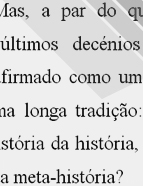

................................
The 1960s and 1970s, during which the Dicionário de História de Portugal [History of Portugal Dictionary] 1963-71), under Joel Serrão was pioneering new horizons, represent a significant period of renewal and expansion of knowledge concerning substantial changes in the writing of history in Portugal. Other authors sought to outline general perspectives on Portuguese historiography: Veríssimo Serrão compiled useful information on authors, the contents of their works, and historiographical trends. Meanwhile, Oliveira Marques published an initial anthology of Portuguese historiography (1974-75), which has remained a tool of reference. This work, preceded by a comprehensive and well-documented characterisation of trends, establishes connections with European historiographical currents and figures, such as the Annales group, highlighting the influence of Lucien Febvre and Marc Bloch on the “Lisbon school” – a debatable concept since, in truth, multiple trends coexisted within the only school at the time in the capital where history was studied, the Faculty of Arts of Lisbon. In universities and the Portuguese Academy of History, the history of history occupied a significant place, marked by conferences and the publication of their r espective proceedings: A historiografia portuguesa anterior a Herculano [Portuguese h istoriography prior to Herculano] (1977), Alexandre Herculano à luz do nosso tempo [Alexandre Herculano in the light of our times] (1977), and Historiografia Portuguesa de Herculano a 1950 [Portuguese historiography of Herculano to 1950] (1978). Even after the April 25 th Revolution, during a period of change and around the centennial of Herculano's death (1977) and thereafter, the historian’s presence remained vibrant, with a significant portion of his work being republished and various studies dedicated to him.
The influence of French historiography in Portugal was notable from the liberal revolution and especially until the 1980s: prominent figures include Ferdinand Denis, the author of a swiftly translated History of Portugal, along with Thierry, Guizot, Michelet, Fustel de Coulanges, and Renan (to name just a few). In addition to this presence was the influence of German scholars (Schaefer, Niebuhr, Mommsen, among others). Beyond Herculano's work and the aforementioned Dicionário de História de Portugal (the latter marked by concepts linked to the Annales), a more recent example of the Francophone imprint should be noted: from the 1980s, as in France, a revaluation of the issues surrounding memories emerged, reconsidering Maurice Halbwachs' conceptualisation through the lens of Pierre Nora's lieux de mémoire .
